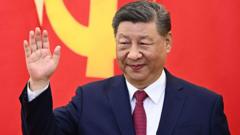During a significant visit to Vietnam, Xi Jinping urged the country to counter what he described as "unilateral bullying," a veiled reference to the United States, reinforcing China's position in the ongoing trade conflict.
China's Xi Encourages Vietnam to Stand Against Unilateral Bullying Amid Trade Tensions

China's Xi Encourages Vietnam to Stand Against Unilateral Bullying Amid Trade Tensions
Chinese President Xi Jinping calls on Vietnam to resist "unilateral bullying" while focusing on global trade stability during his Southeast Asia tour.
In a diplomatic move filled with implications, Chinese President Xi Jinping, on a visit to Vietnam, encouraged the nation to stand firm against "unilateral bullying," implicitly targeting the United States. This visit, part of a broader charm offensive across Southeast Asia, conveys urgent messages amidst rising tensions from a trade war led by President Donald Trump.
Xi's meetings with top Vietnamese officials, including the Communist Party Secretary-General To Lam and Prime Minister Pham Minh Chinh, were marked by discussions to jointly safeguard the principles of global free trade against threats from unilateral actions. "We must strengthen strategic resolve... and uphold the stability of the global free trade system," he announced, as reported by the state-run Xinhua news agency.
This diplomatic overture comes as the U.S. administration has levied tariffs reaching as high as 145% on various Chinese goods, a move that has raised concerns over escalating tensions. Former U.S. trade negotiator Stephen Olson called Xi's stance a "shrewd tactical move," suggesting that Xi is positioning China as a proponent of rules-based trade at a time when the U.S. administration is perceived to be destabilizing international trade norms.
Amid these developments, President Trump expressed skepticism about the meeting, suggesting it was part of a strategy to undermine U.S. interests. "That's a lovely meeting, trying to figure out how do we screw the United States of America?" he remarked when addressing reporters on Monday.
The trade standoff has worldwide ramifications as the two largest economies continue to impose retaliatory tariffs on each other's products. Notably, recent reports indicated that smartphone and computer imports might escape steep tariffs, but Trump countered these claims on social media, labeling them as false.
Xi’s visit began with a warm welcome in Hanoi, where his presence was met with both support and caution from local observers. Indeed, experts like Susannah Patton stress that Vietnam must carefully navigate its relationship with China, recognizing the U.S. as a crucial economic partner.
This diplomatic mission will see Xi proceed to Malaysia, with the intent to meet influential leaders and further solidify China’s narrative as a reliable ally against the backdrop of U.S. protectionism. Overall, analysts predict that Xi’s Southeast Asia tour will continue to be strategically focused on contrasting U.S. actions with China's commitment to cooperative trade relationships.




















